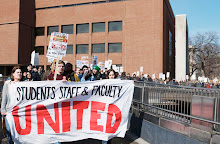Another notable feature of Bruinink's message yesterday is that he formally declared financial stringency. Section 4.5 of the tenure code (http://www1.umn.edu/regents/policies/humanresources/FacultyTenure.pdf) requires that such a declaration be made in order for the administration to temporarily cut faculty salaries.
How are we to assess whether we in fact face financial stringency? Section 3 of the "Interpretations" section of the tenure code states, "Financial stringency in section 4.5 is understood to mean financial difficulties that are unusual in extent and require extraordinary rather than ordinary responses...It is understood that the financial difficulty that would permit the president to propose temporary reductions or postponements in compensation under section 4.5 is less severe than the 'fiscal emergency' outlined in section 11, but it is also understood that 'financial stringency' should not be invoked to respond to foreseeable fluctuations in the University's budget and finances."
Many of the costs mentioned in Bruininks' message, however, were foreseeable--e.g. the 27th pay period and increases in the cost of benefits. Not to mention that the 2 per cent differentially distributed pay pool is certainly a foreseeable expense since it is the Prez's idea. The policy will actually worsen our budget situation by adding to recurring costs.
Of course, the cuts from St. Paul do hurt and there needs to be a serious conversation about how to deal with them. What is most notable about the proposed pay cut on which the faculty are being asked to vote is that it does not deal with the deeper underlying problem. The pay cut is temporary, so there is no dent in recurring costs. Clearly, dealing with the budget crisis requires reevaluating past spending decisions, reassessing the need for expensive new projects, delaying some maintenance and construction, and redefining priorities.
The tenure code in fact requires such a re-evaluation take place BEFORE financial stringency is declared. Section 11.2, which applies in *any financial crisis* (not just a fiscal emergency), lists a number of general principles of priority, the first of which is to pursue means other than the "impairment of faculty rights" for reducing costs. Section 11.3 further requires the president to report to the Senate Consultative Committee and to "identify the magnitude of the shortfall, the measures which might be taken to alleviate it (which must not involve impairment of faculty rights), and alternative measures which have been rejected. The president will give the committee full access to all available information and will respond specifically to additional proposals suggested by the committee. At this stage, the University will consider reductions in other expenses. It will also consider increases in tuition, sales of assets, and borrowing." According to Section 11.4, only after going through the processes required by Section 11.3 may the administration propose the temporary reduction or postponement of faculty compensation.
The administration has not done what is required by Sections 11.2 and 11.3 of the tenure code. In order to impose the cuts on faculty, an ABSOLUTE MAJORITY of the members of the Faculty Senate or TWO-THIRDS vote of its members present and voting (a quorum being present) is required. Since Bruininks has not complied with the requirements to impose a cut in faculty salaries, we recommend that Senators reject the administration's proposal on March 25. It is time for the administration to engage in a meaningful dialogue with all stakeholders about the future of the University. In the next week FRPE will present some alternatives to the president's proposal. Stay tuned.
See Periodic Table for some great posts on this matter: http://ptable.blogspot.com/2010/03/violation-of-tenure-code-at-university.html#links and http://ptable.blogspot.com/2010/03/is-interpretation-of-regents-policy-on.html#links
Saturday, March 13, 2010
Subscribe to:
Post Comments (Atom)


There are further problems concerning the voting standards to be used at the upcoming Faculty Senate meeting. They are currently in violation of the tenure code.
ReplyDeleteFor details, please see:
http://ptable.blogspot.com/2010/03/further-problems-with-upcoming-faculty.html